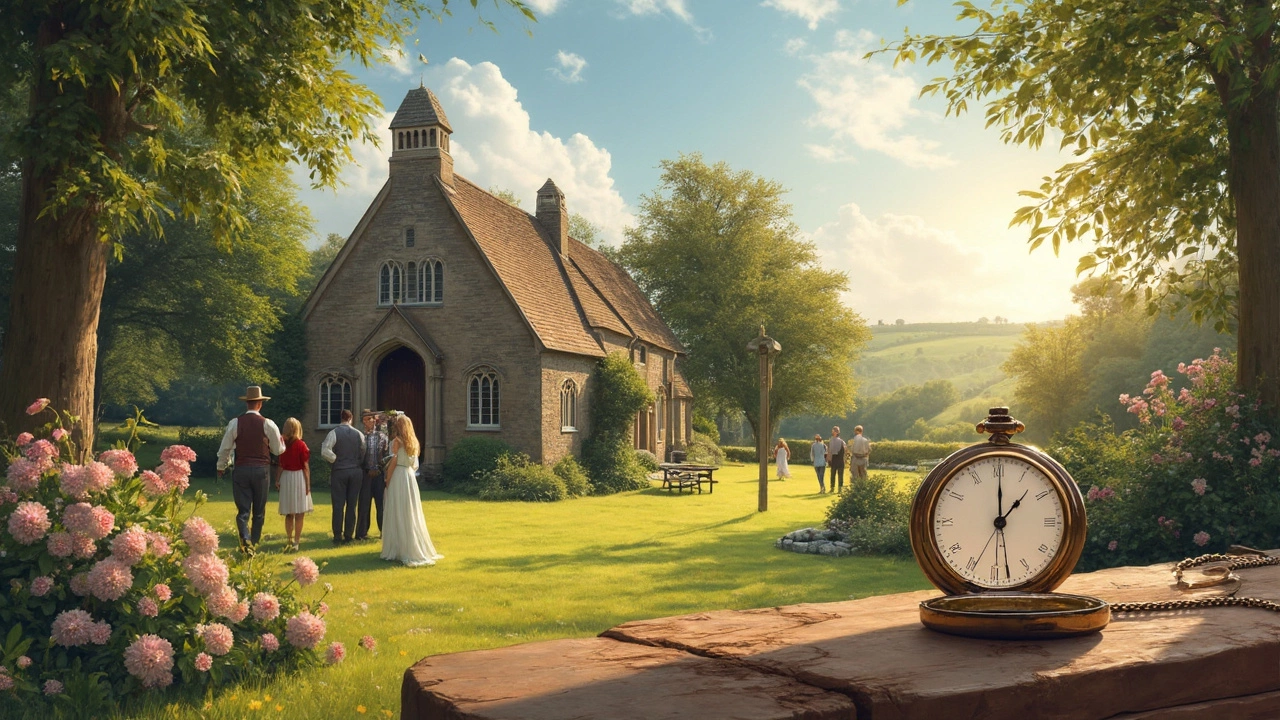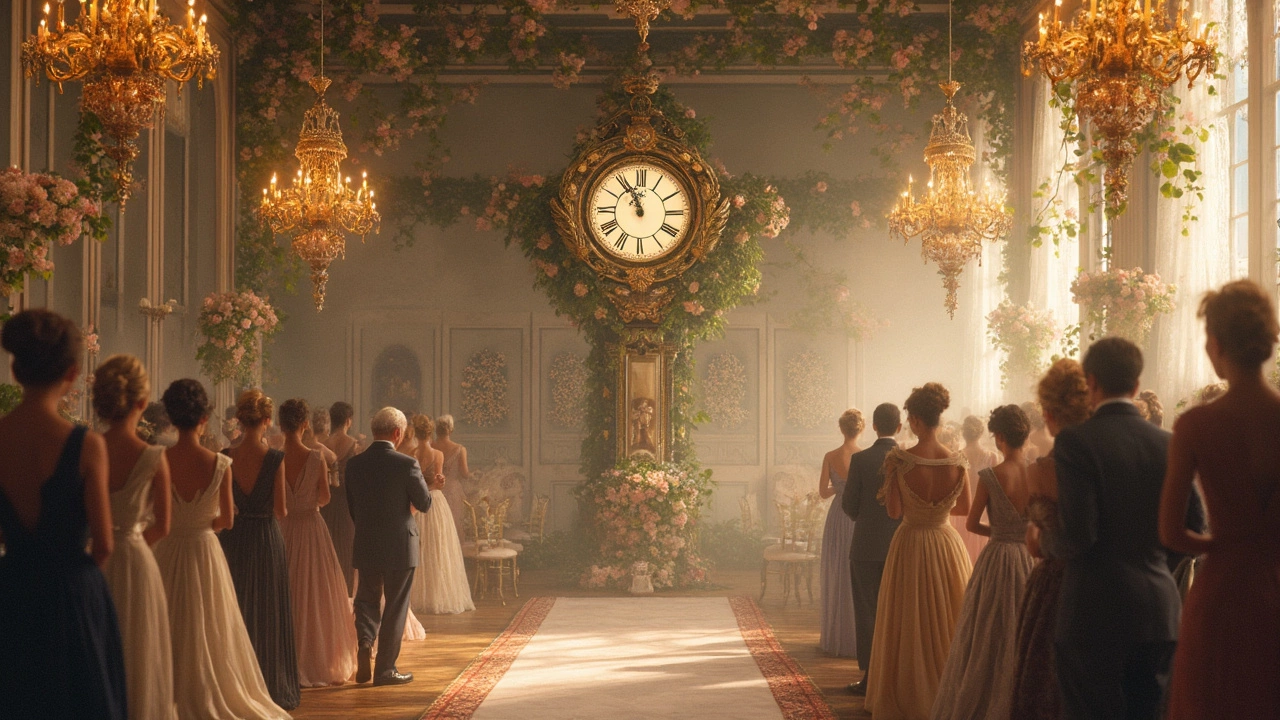You'd think setting a time on your wedding invitation is a straightforward task, right? Turns out, it's not just a 'pick any time' scenario. The time you choose impacts everything, from the guests' arrival to the flow of your big day. So, getting it right is crucial.
First off, think about your ceremony's pacing. Do you want a classic afternoon affair or a romantic evening gathering? The time on your invite sets expectations. If you plan a sunset ceremony, the invite should reflect that, giving guests enough clues to dress appropriately and arrive on time.
One common blunder folks make is setting the time right when the ceremony begins. This leaves no wiggle room for latecomers. A smart move is to list the time a bit earlier—let's say 15 to 30 minutes before the actual start. This way, fashionably late guests don't miss the 'I Dos.'
Why Timing Matters
Picking the right time for your wedding invitations is crucial—not just for aesthetics, but for practical reasons too. After all, who wants guests rolling in during their vows? Timing helps set the rhythm of your whole day, and a well-timed invite can save a lot of headaches.
Setting Expectations
Think of the time on your invite as the first clue about your wedding's vibe. An early afternoon ceremony means more daylight for photos but maybe a longer gap before dinner. Meanwhile, an evening start might need some pre-ceremony snacks to keep the guests from grumbling. As the wedding planner Jane Doe says, "A thoughtfully chosen invite time can make or break the flow of your wedding day."
"Timing isn’t just about logistics. It’s about orchestrating an experience that feels seamless and natural for everyone involved." — John Smith, Expert Wedding Planner
Avoiding Common Pitfalls
It's easy to overlook the importance of buffer time. Listing the ceremony start time on the invite doesn't mean that’s when guests should arrive. Fact is, about 10% of guests typically arrive late due to traffic or parking mishaps. To ensure they make it, setting the invite time 15 to 30 minutes early is a good buffer. This means if your ceremony starts at 4 PM, consider listing 3:45 PM as the invite time.
Alternatives for Different Traditions
Different cultures have different norms. Some cultures favor morning ceremonies, while others lean towards evening celebrations. Knowing these customs can help you decide on a time that respects traditions while fitting your personal style.
Bonus: Timing and Daylight
If you’re planning an outdoor ceremony and aiming for beautiful natural light, consider the sunset time. Below is a handy chart to help with timing based on the time of year:
| Month | Suggested Ceremony Time |
|---|---|
| March | 4 PM |
| June | 5:30 PM |
| September | 5 PM |
| December | 3:30 PM |
Choosing the right time for your wedding invitations isn’t just a small detail; it’s a pivotal decision that can impact the whole vibe of your day. Get it right, and everything from guest arrivals to sunset photos will fall perfectly into place.
Common Mistakes
When it comes to wedding invitations, you'd be surprised how easy it is to make a mistake with the timing. Here are some slip-ups that can be easily avoided with a bit of planning.
Setting the Time Too Close to the Ceremony
Listing the ceremony start time as the same time you expect everyone to arrive is an invitation for chaos. Guests might be stuck in traffic or searching for parking, and they could end up missing important moments. Give a cushion of 15 to 30 minutes before the actual start time.
Ignoring Travel Time and Traffic
If your venue is in a high-traffic area or your ceremony and reception are in different locations, keep travel time in mind. It's easy to forget that guests need time to move between spots, especially during rush hours.
Remembering Your Vendors
Don't forget the schedule of your vendors. From your photographer to the caterer, these folks need ample time to set up. By starting your event later than stated, you're giving them a buffer to work without pressure.
Forgetting Cultural Norms or Traditions
Cultural considerations can sometimes dictate the timing of ceremonies. If you're having a multicultural wedding, be aware of traditional customs that might affect when things should start or end.
Here’s a quick recap in table form to help you avoid these common timing pitfalls:
| Common Mistake | Better Approach |
|---|---|
| Time set to ceremony start | List time 15-30 mins earlier |
| Forget travel/traffic | Account for extra travel time |
| Neglecting vendors | Give vendors ample prep time |
| Ignoring cultural norms | Be mindful of traditional timings |

Cultural Considerations
If you've ever been to a wedding, you'll know that culture plays a huge role in how the day unfolds, including the time to put on the wedding invitations. Different traditions might dictate specific times or rituals that you need to be aware of.
Timed Traditions
In some cultures, like Hinduism, the timing of the wedding ceremony is determined by astrology. The auspicious time, called 'Muhurta,' can significantly vary, sometimes even being early in the morning or late at night. A Hindu bride might tell you that she started her wedding at the crack of dawn, even if it meant waking the rooster!
On the flip side, many Christian weddings traditionally happen in the afternoon. A church wedding might have a preferred slot squeezed between the end of Sunday service and evening events.
Quotes from Cultural Experts
"Honor your cultural heritage when deciding on ceremony times. It's about weaving tradition into your modern-day plans." — Raj Patel, Cultural Wedding Planner
Practical Tips
Consider the cultural practices that might also affect timing:
- Jewish Weddings: Held after sunset on Saturdays, aligning with the end of Shabbat.
- Chinese Traditions: Often choose the lunar calendar for setting a date and time.
- Italian Celebrations: These might start late and carry on past midnight to accommodate elaborate dinners.
If your wedding involves blending cultures, figuring out the timing can be tricky but not impossible. It might help to lay out a timeline and discuss it with both families, seeking a compromise or creating a fusion that respects both sides.
So remember, your wedding invitation's time is not just about ticking clocks—it's about honoring practices that might span generations. Balancing cultural norms with practicalities is a dance, but one that can make your day uniquely yours.
Tips for Choosing the Right Time
When figuring out what time to put on your wedding invitations, let's start with the big picture. The time on your invitation is more than just numbers; it sets the tone and kicks off your entire day. Here are some tips to get it right:
1. Consider the Venue's Constraints
Venues come with their own rules. Some places have strict start and end times, so double-check what they allow before sending out those invites. Missing this step could mean rushing or paying extra to extend hours.
2. Think About Your Guests
Your guest list might include a range of people, from early risers to night owls. While you can't please everyone, aim for a time that accommodates the majority. If kids are involved, perhaps avoid late evenings. For older guests, an afternoon ceremony might be just right.
3. Factor in Lighting and Photography
Want the perfect wedding photos? Timing can make or break them. Photographers often talk about 'golden hour'—the last hour of light in the day when natural light is soft and flattering. Scheduling your ceremony to catch this can lead to some truly stunning pics.
"Timing your ceremony to wrap up just before sunset offers the best light for photos," says wedding planner and timing expert, Emma Lovejoy.
4. Look at Traditional Timings
Ceremonies traditionally kick off at times like 3 PM or 4 PM. These slots offer a balance, giving guests time to travel, and later, enough space to enjoy the reception. But hey, nothing's set in stone.
5. Be Mindful of Meal Times
If your ceremony is around meal times, think about when exactly folks will eat. Planning a 2 PM ceremony could mean lunch is skipped or delayed, which isn't ideal for anyone.
| Time | Pros | Cons |
|---|---|---|
| Morning | More daylight, lower venue costs | Too early for some guests |
| Afternoon | Convenient, ideal lighting | Potentially hottest part of the day |
| Evening | Romantic setting, cooler temperature | May end late, higher venue costs |
One final nugget of advice: once you've picked the time, stick with it. Changing it later can lead to confusion and unnecessary stress. Remember, your wedding is about celebrating with loved ones, not everyone looking at their watches.

